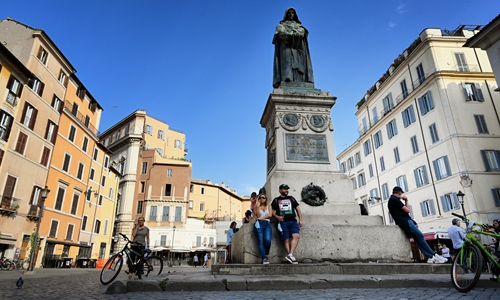TRAVEL / GALLERY
Italy’s tourism renaissance
Sector expects recovery harking back to post-WWII period

People relax on Campo dei Fiori in central Rome, Italy on Monday as the country's lockdown is easing after over two months. Photo: AFP

Tourists walk in central Rome on Monday. Photo: AFP
Countless novels and films have been set in Italy in the 1950s and 1960s, an era that still inspires nostalgia in Italians old enough to remember the period. This might be the direction for the country's tourism as it comes out of the months-long coronavirus crisis, analysts say.
At that time, Italy was emerging from the biggest European crisis of the 20th century - World War II - which left the country's economy and its tourism industry in tatters. But as the economy rebuilt itself after the bloodshed and destruction of the war, the tourism sector did as well.
Analysts said the first tourists were Italians rediscovering their own country, with small numbers of people trickling in from other parts of Europe mixed with a handful of former American soldiers who had been stationed in Italy during the war, returning with their families.
Photos from the time look quaint by modern standards: Small groups of tourists casually exploring cultural sites in Florence, Naples, Rome, Venice, and other cities; visitors sitting in a scenic piazza over a cup of coffee or a glass of wine; a handful of people taking in the artwork on a museum wall.
"Italy was struggling to emerge from the destruction of the war," Annunziata Berrino, a contemporary history professor from the University of Naples Federico II, told Xinhua. "Italy has been popular with tourists going back centuries, but after the war, things were tentative. At first, nobody had money to travel and when they did they stayed close to home."
Alessandro Tortelli, director of the Florence Tourism Study Center, a non-profit tourism research group, said the Italian tourism industry was small at the time.
"There were no souvenir shops like the ones so popular today, there were no restaurants that focused exclusively on visitors," Tortelli said in an interview. "The people visiting Italy bought the things Italians bought, they ate in the places Italians ate."
According to Berrino, Tortelli, and other analysts and observers, as Italy emerges from the months-long coronavirus crisis, it could be headed for a period that in many ways is similar to that of the 1950s and 1960s when it comes to tourism.
Earlier this month, Cultural Heritage and Tourism Minister Dario Franceschini said Italy was unlikely to see many foreign tourists before next year, adding that it could be 2023 when the sector recovers completely. The first wave of tourists, Franceschini said, will be Italians staying close to home.
Matteo Montebelli, head of Research & Publications at the Italian Touring Club, Italy's largest tourism association, agreed.
"Italy's tourism sector could come out of this looking more like it did in the 1950s than the way it did in 2019," Montebelli told Xinhua.
While that description may paint an idyllic image for potential visitors, it is less than ideal for owners of restaurants, hotels, tour guide services, and other economic sectors that rely on tourists. Tortelli noted that the number of tourists in Italy in 1960 was only around one-sixth of the number the country hosted in 2019.
Flights and trains into the country and museums, restaurants, and bars for those in the country will all be limited by social distancing rules. Additionally, weeks of lockdown amid the global crisis will limit the discretionary income of those who do travel to Italy.
Tourism sector operators are asking for help from the Italian government and the European Union. So far, stimulus packages do include provisions to help incentivize domestic tourism and to help businesses weather the worst of the coronavirus crisis.
Berrino said she was sure the Italian tourism sector will survive the tragedies of the pandemic, but said it was far from clear how it will do so.
"After every crisis, tourism changes in some significant way," she said. "We don't know how that will happen this time."
